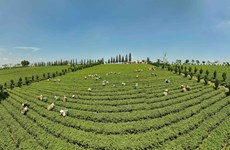Summer-autumn rice yield increases in southern region
The southern region expects to harvest an average of 5.66 tonnes of paddy per hectare in the current summer-autumn crop, 139 kilogrammes more than last year, according to the Ministry of Agriculture and Rural Development’s Plant Cultivation Department.
 Harvesting summer – autumn rice in Vi Thanh city in Hau Giang province. (Photo: VNA)
Harvesting summer – autumn rice in Vi Thanh city in Hau Giang province. (Photo: VNA)Hau Giang (VNA) - The southern region expects to harvest an average of 5.66 tonnes of paddy per hectare in the current summer-autumn crop, 139 kilogrammes more than last year, according to the Ministry of Agriculture and Rural Development’s Plant Cultivation Department.
The region is entering the harvest season and estimates output will be around 9.24 million tonnes.
The region, which comprises the Mekong Delta and south-eastern region, has planted 1.64 million hectares, down 46,000ha from last year, with the delta accounting for 42,000ha.
Speaking at a seminar in Hau Giang province this week, Le Thanh Tung, deputy head of the department, said the 42,000ha in the Mekong Delta are now used to grow high–value crops or for aquaculture.
The switch was due to the low prices rice farmers got for the 2018-2019 winter-spring crop and the delay in the arrival of rains in some areas.
The southern region has increased the rate of high-quality rice varieties it grows in the summer-autumn crop.
Specialty and fragrant varieties account for almost 25 percent, high-quality varieties for 44 percent, medium-quality varieties for 19 percent, and other varieties including glutinous for the remaining 12 percent.
For the upcoming autumn-winter crop, the department is considering two options for the Delta: planting 750,000ha, up 9,380ha from last year, or 700,000ha.
If the latter is chosen, 30,000 will be left inundated during the Mekong flooding season and other crops and aquatic species will be raised on the remaining area.
Deputy Minister of Agriculture and Rural Development Le Quoc Doanh said the main criterion is not the area but the safety of the crop.
The autumn-winter rice should be grown in areas with flood-prevention embankments, he said.
The ministry’s relevant departments should do the task of forecasting weather and availability of water properly so that each locality can draw up appropriate planting schedules, he said.
They should counsel farmers to focus on high-quality and fragrant rice varieties to meet export demand, he added.-VNA












